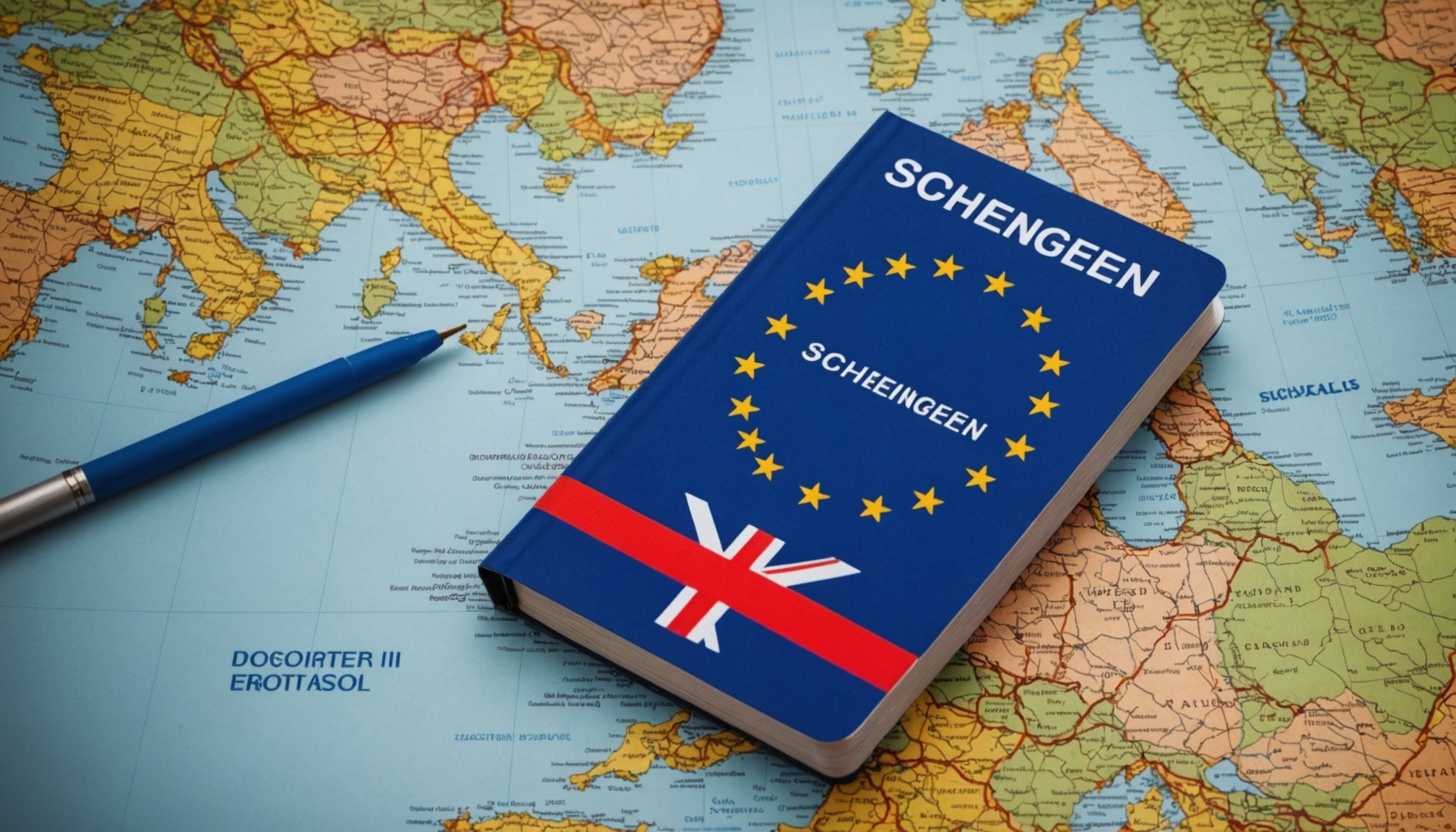Overview of Changes to Travel Regulations for UK Tourists
Navigating travel in the post-Brexit landscape presents new challenges and rules for UK tourists. Key changes to travel regulations particularly affect trips to the Schengen Area. Before Brexit, UK citizens enjoyed free movement within this European zone. Now, UK tourists must comply with new regulations.
Firstly, UK tourists can stay in the Schengen Area for up to 90 days within any 180-day period without a visa. This rule requires careful planning to avoid overstaying, which can lead to penalties or entry bans. Additionally, passports must be valid for at least three months beyond the trip’s end.
A voir aussi : Essential tips for thriving gardens in the farmingdale observer
Understanding these new travel rules is essential. UK tourists might encounter challenges like longer border checks or different documentation requirements. Travellers should also anticipate potential changes to health insurance coverage and mobile roaming charges within the EU, both of which may incur unexpected costs.
In summary, the impact of Brexit mandates increased vigilance and the need for awareness of travel regulations. By preparing adequately, UK tourists can minimise disruptions and enjoy seamless journeys.
Avez-vous vu cela : Essential Guidelines for Introducing Protected Plant Species in UK Gardens: A 2023 Overview
Visa Requirements for UK Tourists
UK citizens planning to travel to Europe must navigate a series of visa rules due to the country’s departure from the EU. Understanding the Schengen visa process is crucial for unrestricted travel across various European nations.
Types of Visas Available
UK tourists have several options when it comes to Schengen visas. The most common is the short-stay visa, allowing visits up to 90 days within a 180-day period. Long-stay visas are for those planning to stay over 90 days, often for work, study, or family reunification.
How to Apply for a Schengen Visa
Applying for a Schengen visa requires careful preparation. Start by selecting the visa type, then gather required documents, including a valid passport, recent photographs, travel insurance, and proof of accommodation. Applicants must fill out the application form, schedule an appointment, and submit the documents at the corresponding consulate or visa center.
Processing Times and Fees
Processing times for Schengen visas vary. Typically, decisions are made within 15 days, but it’s advisable to apply at least four weeks in advance. Fees also differ depending on the visa duration and applicant’s age, with short-stay visas generally costing around €80. Being aware of these factors helps ensure a smooth application process.
Duration of Stay in the Schengen Area
Navigating the length of stay within the Schengen Area is crucial for ensuring compliance with Schengen travel rules. For UK tourists, the maximum duration permitted is outlined by the widely referenced 90/180-day rule. This means you can stay up to 90 days within a rolling 180-day period. It’s essential to be aware of your entry and exit dates, as non-compliance can result in penalties, including fines or potential future entry bans.
Understanding the 90/180-day Rule
The 90/180-day rule is a bit elusive, yet straightforward. Your days of stay are cumulative—counting those spent in any of the Schengen countries within the past 180 days. This rolling time frame can become challenging to track if visiting frequently or staying for extended periods.
Tracking Your Stay Duration
Adopting best practices for monitoring your stay duration can save you from unintended overstays. Utilize online calculators or mobile applications specifically designed for this purpose. Always check stamps in your passport upon entry and exit to ensure dates align with your itinerary. Keeping a detailed travel log will further enhance accuracy and peace of mind, ensuring your visits remain hassle-free and compliant.
Passport Validity Requirements
When planning international travel, understanding passport validity is crucial. Different countries have varying entry requirements to ensure travellers’ documents are up to date.
Minimum Validity Period
Many countries set a minimum passport validity period, commonly requiring passports to be valid for at least six months beyond your stay. This rule helps avoid any issues that may arise if your departure is delayed or extended. However, some nations may allow a shorter validity period, typically three months. It’s vital to check the specific requirements of your destination country ahead of your trip.
Recommendations for Passport Renewal
It’s advised to renew your passport well before it reaches the six-month validity threshold. The process can take time, and renewing early prevents unexpected travel delays. Consider starting the renewal process at least nine months before your passport expires. This ensures sufficient time to address any complications, such as the need for additional documentation or longer processing times due to busy periods.
Specific Passport Conditions
Certain passport conditions can affect entry, such as the passport’s physical state. Ensure your passport is free of damage, with all pages intact and unmarked other than official visas or stamps. Also, some countries require recent photographs, undamaged biometric chips, or machine-readable formats. Always verify these specific conditions in the entry requirements of your travel destination.
Health Insurance Needs
Understanding health coverage requirements for entry into the Schengen area is crucial for travelers. A specific need for travel insurance arises from the Schengen requirements mandating that travelers hold insurance with a coverage of at least €30,000. This must cover medical expenses and emergency hospitalization across all Schengen countries.
The recommended types of insurance include comprehensive travel insurance that also offers health coverage. Travelers should ensure their policy includes benefits like coverage for emergency medical evacuation and repatriation of remains, which are essential for meeting Schengen requirements.
While reviewing insurance options, some resources to consider for purchasing suitable travel insurance include:
- International insurance companies offering global coverage
- Specialized travel insurance providers focusing on Schengen policies
- Online comparison tools to evaluate policy features and prices
Opt for providers that clearly outline what their policies cover, ensuring you meet all Schengen requirements, especially regarding medical emergencies. By carefully evaluating policy offerings and using reliable resources, travelers can effectively secure the necessary health coverage for their journey.
Changes to Border Control Procedures
Understanding the recent border control changes is essential for travellers. With heightened focus on security, security checks have been revamped to ensure safety and efficiency.
New Border Control Practices
Travellers should anticipate more thorough security checks at entry points. These adjustments aim to enhance safety and streamline the process, even though they may result in longer wait times. The introduction of advanced scanning technologies and additional personnel at checkpoints is part of this change.
Customs Regulations and Requirements
Navigating customs has also evolved with updated regulations. Visitors to the UK need to be aware of specific entry point guidelines. This includes declaring certain goods and understanding limitations on items such as alcohol and tobacco. Failure to comply may lead to fines or confiscation of goods.
What to Expect During the Arrival Process
Upon arrival, tourists can expect a systematic approach at border control. Enhanced security measures mean clearer, sometimes more robust questioning at passport checks. To facilitate a smooth experience, it’s advised to have travel documents prepared. This includes passports, visas, and any required declarations.
These changes reflect a global trend towards stricter security checks to ensure safe and orderly travel experiences. By preparing in advance, travellers can enjoy a seamless journey through these updated procedures.
Specific Documentation Required
When preparing to travel to the Schengen Area, it’s crucial to have a comprehensive travel checklist of essential documents. A valid passport is the first requirement, with a minimum of three months’ validity beyond your intended departure date from the Schengen Zone. Additionally, a Schengen Visa might be necessary depending on your nationality. Ensure you possess recent passport-sized photos if applying for a visa.
Another important aspect of travel preparation includes organizing travel insurance that covers medical emergencies within Schengen countries. The insurance should have a minimum coverage of 30,000 Euros.
Additionally, in light of recent global events, it’s important to check for any COVID-19-related documentation requirements. These could include vaccination certificates, negative test results, or health declaration forms depending on entry regulations.
To streamline the process, create a structured travel checklist. This can help verify you’ve gathered all necessary documents, reducing potential stress. Use folders or digital storage solutions to organize electronic copies of these documents, ensuring easy access when required.
Being proactive in your travel preparation can ensure a smoother and more enjoyable journey.
Practical Tips for a Smooth Travel Experience
Navigating travel can often be an adventure, but with thoughtful planning and the right tips, you can significantly improve your experience.
Preparing for Unexpected Situations
Travel tips are essential for handling the unexpected. Always keep a backup plan for delays or changes in plans. This might include alternate routes, flexible accommodation options, or even a digital copy of important documents. Consider using travel insurance to mitigate the effects of unforeseen circumstances, providing peace of mind on your journey.
Communication Tips
Effective communication tips while travelling are critical. Familiarise yourself with local communication methods and etiquette to avoid misunderstandings. Download translation apps like Google Translate or carry a pocket dictionary to help bridge language gaps. Remember, a smile remains a universal gesture, helpful in fostering positive interactions.
Cultural Considerations
Understanding and respecting cultural considerations can greatly enhance your travel experience. Take time to learn about local traditions and customs as this displays respect and openness. Being aware of gestures, attire etiquette, and dining manners in different cultures can help you avoid faux pas and build meaningful connections with the locals.
Real-Life Examples and Case Studies
Navigating the evolving landscape of travel regulations can be frustrating, especially for UK tourists. Let’s explore some insightful traveler experiences and case studies to understand this better.
Consider the story of Claire, a frequent traveler from Manchester, who recently booked a trip to Spain. Unbeknownst to her, local regulations required a specific health form upon entry. Her misstep in not completing this form timely led to a missed connection and additional costs. This underscores the importance of staying updated with travel regulations before departure.
Another example is James, a business traveler heading to Germany. He meticulously checked requirements and discovered new quarantine protocols just days before his trip. By adjusting his schedule, he avoided inconvenience upon arrival. This scenario highlights how proactive planning allows for seamless travel experiences.
Recent travel scenarios also include Lucy’s journey to France. She faced unexpected baggage delays due to recent changes in customs procedures. Her ordeal serves as a lesson in the importance of flexibility and patience.
These case studies reveal the nuances of navigating modern travel. Ultimately, staying informed, flexible, and prepared can significantly alleviate potential stress during your journey.
Links to Official Resources for Further Information
Seek authoritative guidance to ensure you’re up-to-date with travel regulations. Here’s where to look:
UK Government Resources
Explore the UK Government’s official website for comprehensive travel guidance. It provides links to government resources featuring vital information like visa requirements, health advisories, and regional restrictions. Regular updates ensure that you are aware of any changes impacting your journey.
Schengen Area Official Sites
For travel within the Schengen Area, consult official resources from Schengen countries. Their websites offer real-time updates on border policies, entry requirements, and public health measures. Access these links to not only prevent travel disruptions but also to stay informed of any necessary procedures before and upon arrival.
Travel Advice from Airlines and Agencies
Airlines and travel agencies are integral in guiding passengers through evolving travel landscapes. Agencies like IATA provide current travel advice that details documentation needs and carrier-specific requirements. Checking these government links and consulting with airlines directly ensures that you’re equipped with accurate travel documentation and understand the processes involved in your trip.











